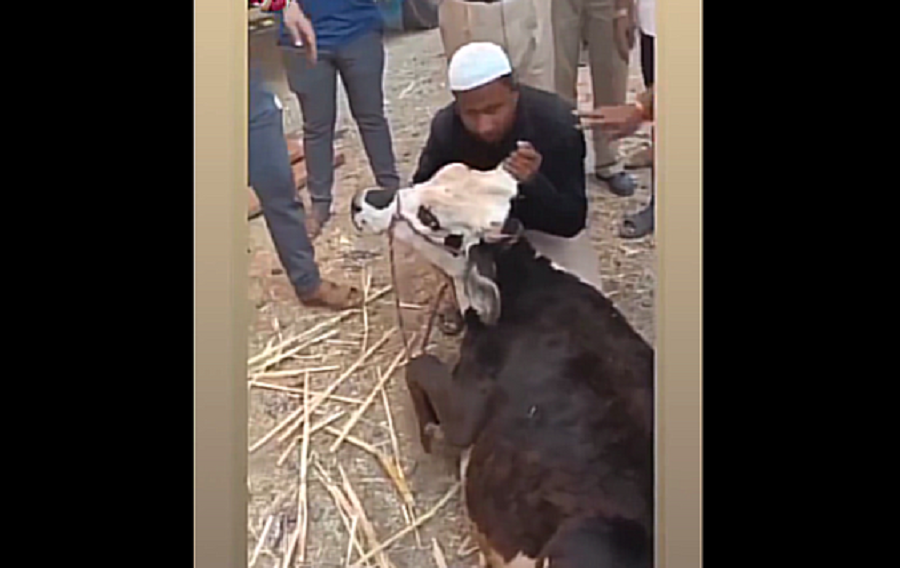Text: Traditionally, news of cow vigilantism has typically emanated from the northern belt of India. States like Haryana, Rajasthan, Uttar Pradesh, Madhya Pradesh, and the National Capital Region have long struggled with the problem. However, recent weeks have witnessed a troubling surge in cow vigilantism incidents within Maharashtra, signaling a perilous future for the state.
A video that emerged from Sangavi, Pune on Wednesday depicted a high-speed chase of a truck, resulting in a subsequent accident. The footage showed the relentless pursuit, with the assailants shattering the truck’s windows and windshield. The truck driver appeared distressed, his clothes torn, as the attackers interrogated him about the nature of his cargo and its intended destination. The video did not confirm whether the contents were indeed cow meat.
Location: Sangavi, Maharashtra
Cow vigilantes led a high-speed chase to stop a mini truck over suspicion of transporting cattle, which resulted in an accident.
The vigilantes also roughed up the driver. pic.twitter.com/k6UNixITFm
— HindutvaWatch (@HindutvaWatchIn) May 10, 2023
Under The Maharashtra Animal Preservation Act, 1976, section 5A (inserted in 2015) states that “(1) No person shall transport or offer for transport or cause to be transported cow, bull or bullock from any place within the State to any place outside the State for the purpose of its slaughter in contravention of the provisions of this Act or with the knowledge that it will be or is likely to be, so slaughtered.”
On May 4, a high-speed chase in Nashik resulted in a horrific accident involving not only the truck driver but also the cow vigilantes themselves. The truck was left severely mangled, with the cattle lying injured on the road. In the video, one of the cow vigilantes questioned the driver, inquiring about his injuries—whether they were caused by the accident or by physical assault. The driver claimed his injuries were solely due to the accident, denying any assault. The vigilante warned him that he was fortunate to escape this time but should not repeat such actions in the future.
Location: Nashik, Maharashtra
On May 4, cow vigilantes led a high-speed chase to halt a pickup truck over the suspicion of transporting cattle for slaughter, which resulted in a fatal accident.
Both truck driver and cow vigilantes have suffered injuries. pic.twitter.com/1bvRDmWl4n
— HindutvaWatch (@HindutvaWatchIn) May 5, 2023
In Latur on April 23, a Muslim man named Asif, who was transporting cattle, was apprehended by cow vigilantes. They forced him to wear his skull cap and bow before a cow, demanding an apology. Allegedly, Asif suffered injuries and was later admitted to a hospital, all of which unfolded in the presence of the police. Asif had purchased 18 cattle from one market with the intention of selling them at the Ausa-based animal market. However, before he could reach his destination, he was intercepted by the vigilantes. Subsequently, the police arrived, seized the vehicle and the cattle, and lodged a complaint stating that Asif had illegally purchased the animals with the intention of slaughtering them for beef, while also neglecting to provide proper fodder and water arrangements for the cattle. The police took the vehicle and the driver to the Gaushala (cow shelter). At the Gaushala, in the presence of the police, the cow vigilantes allegedly assaulted Asif, made him wear a skull cap, and coerced him into embracing a cow, all while recording the incident. As locals protested against the police’s support of the cow vigilantes, the Superintendent of Police (SP) in Latur, Somay Munde, initiated a departmental inquiry and repatriated three home guards. The local police initially refused to register an FIR, prompting a complaint to be filed with the SP’s office. The complainants alleged that Asif was assaulted and forced to consume cow urine. However, the police denied these allegations, stating that Asif was taken to the hospital due to an increase in his blood pressure. Yet, the complainants cited hospital records to support their claim that Asif had indeed sustained blunt injuries.
#Thread#Gaurakshaks or #cow vigilantes made 28-year-old Asif Qureshi to wear skull cap and bend to the #cow. All this happened in the presence of #policemen 4m #Latur district, #Maharashtra.
Asif’s #crime : transporting #cattle in his mini truck from one market to another
N/1 pic.twitter.com/72tsNVQ0FV
— Mohammed Akhef TOI (@MohammedAkhef) April 28, 2023
Related:
Allahabad HC calls out misuse of law in cow slaughter case as only cow dung recovered from scene
Cow vigilantism is an extortion bid say Haryana farmers
The poster boy of cow vigilantism, Monu Manesar, is back
Karnataka’s Shame: Cattle trader, a Muslim, beaten to death by cow vigilantes

